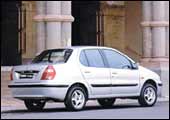 |
| Bajaj scooters: A new gamble |
When
Bajaj, the classic scooter brand, wanted to rev itself up in the
motorcycles market-the "future" in Rajiv Bajaj's 1998
take-analysts were sceptical. Confounding them took some time. But
once its hot bikes, such as the Pulsar, hit the tar, Bajaj vroomed
forth. Today, mobikes account for 70 per cent of its turnover.
Why then, should Bajaj return to scooters?
One reason is that it cannot claw deeper into mobike leader Hero
Honda's marketshare. The other is the success of Honda Activa, which
has shown that there is a market out there for modern scooters.
Last but not least, Bajaj's cash-rich balance sheet means it can
afford to put money where its hunch is. It maintains an R&D
spend of about Rs 100 crore.
''It is time to develop scooters that will
redefine the category,'' says R.L. Ravichandran, Vice President
(Marketing and Business Development), Bajaj Auto: ''We want to put
the romance back in scooters.'' A crack team is working on an all-new
scooter platform that would yield a number of four-stroke models,
some with automatic transmission and others with variomatic (two
gears and four). The prime concern is body styling (the services
of Tokyo Research & Development, which helped sculpt Pulsar
and Saffire, might be used). The new purrers will be displayed at
the 2004 Auto Expo, and hit the market soon after.
-Suveen K. Sinha
HOSPITALITY
Signs Of Life
After a long season of empty hotel rooms,
the hospitality sector is warming up again. A sign of things to
come?
 |
| Hotel occupancy: Good times are here |
It's been a long
hard winter, and now the sun seems to be out again. Hotel-room tariffs
are rising. This is so across Mumbai, Delhi, and Bangalore, as October
and November data indicates. The 337-room Mumbai Oberoi registered
India's highest average room rent (ARR) in this period, at Rs 7,200-7,300.
It is followed by the 265-room Imperial in Delhi (Rs 6,000-6,200)
and the 582-room Taj in Mumbai (Rs 5,500-6,500).
Says Rattan Keswani, General Manager, The Oberoi
Group: ''The buoyancy is back, elections have gone well and travel
advisories removed, and we are fairly optimistic that the year will
end well.'' Delhi's Imperial, meanwhile, has gained from its recent
repositioning, on the business platform, and a spurt in city demand.
According to Rishi Kapoor, Director (Strategic Planning), The Imperial,
Delhi: "October-November occupancy has been 75 per cent,''
up from last year's 60s. The hotel's ARR is up 30 per cent.
Mumbai's Taj is doing well, as always. But
the new competitor on the scene is the city's Royal Lé Meridien,
which, located near the airport, claims an occupancy of 90 per cent
now.
-Moinak Mitra
AUTOMOTIVE
Just Another Box
Telco's new family car is all set to
give its rivals a run for their money.
 |
| Tata Indigo: Doesn't have the hype Indica
enjoyed |
Telco's sedan,
the Indigo, looks like an Indica with an add-on box. So, will it
worry its rival sedan marketers? Depends on the pricing. As BT went
to press, there were no firm figures, though Chairman Ratan Tata
had hinted of a range of Rs 4-7 lakh. Anything within reach of hatchback
owners could entice upgrades; a sedan is what a 'family car' is
supposed to be.
Indigo boasts of five variants, two of them
powered by a 1,405-cc, 62-bhp diesel engine. A diesel base model
for around Rs 4.5 lakh- Maruti Esteem's diesel variant is for Rs
5.4 lakh-could repeat Indica's success. Maruti could respond by
cutting diesel prices, while Hyundai Accent and Ford Ikon are geared
for a 'value' fight. ''We won't let Indigo get away easily,'' says
a rival spokesperson, aware that Indigo's petrol variants can't
be ignored either. Indigo's sales target: 1,200 units a month. That
would spell break even. The project took just Rs 350 crore, rather
less than Indica's Rs 1,700 crore.
Suveen K. Sinha
RETAIL
Reliance's Qwiky
Reliance with a coffee shop presence?
It makes sense, if you think about the brand's telecom need for
retail coverage.
 |
| Coffee play: What will it be? Coffee,
tea, or telecom? |
It's not official
yet. But the whiff is too strong to let pass. Reliance Infocomm
is picking up a stake in the Chennai-based Qwiky's chain of coffee
bars. Some coffee watchers would respond with a knowing 'aha'. Others
would be zapped.
For the latter's benefit, here's the rationale:
Reliance Infocomm needs retail presence to kick off its WLL telecom
strategy, and what better than a chain of stores, Webworld, to get
customers warmed up to its ideas over cups of coffee?
Sashi Chimala of Quiky's refuses to comment
on any equity deal, preferring to voice his own plan to go from
22 to 62 coffee bars across India over the next 12 months. The strategy?
Offering in-store coffee bars to retailers. ''All I can say at this
stage,'' he says, ''is that we are excited by being the first company
in India to offer BPO kind of services in the food and beverages
sector.''
Equally tightlipped, is Vrinda Walvalkar, spokesperson
for Reliance Infocomm. But Naresh Malhotra, Director of Café
Coffee Day, a rival chain, thinks that selling coffee as a secondary
objective is bad for coffee. Chimala disagrees, citing the value
of BPO services.
Venkatesha Babu
|

